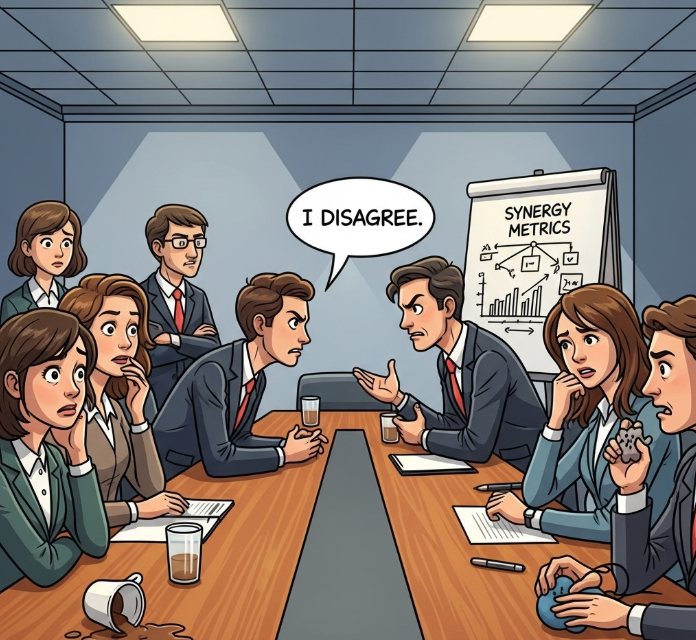The Problem With Just Saying “I Disagree”
We’ve all been there. You’re in a meeting, someone proudly unveils their brilliant idea (spoiler: it’s terrible), and you — the bold truth-teller — blurt out:

“I disagree.”
And just like that, the room’s mood drops faster than your phone battery when you open Instagram.
Here’s the thing: in English, what you say matters, but how you say it decides whether you leave the meeting respected… or quietly unfollowed on LinkedIn.
So let’s turn your blunt “Nope” into something more… edible. In this guide, you’ll learn the fine art of disagreeing politely in English, complete with useful phrases, tone tips, and enough practical advice to save you from future awkward silences.
Why Polite Disagreement Is Basically Social Magic
Polite disagreement isn’t about faking agreement or sugarcoating reality. It’s about making your point without causing the other person to mentally add you to their “people I’d never help in a zombie apocalypse” list.
In professional settings, research shows respectful communication increases productivity by up to 30%. That’s because people actually listen when they don’t feel attacked.
Plus, English gives you a whole buffet of polite disagreement phrases — use them right and you’ll sound like someone with English communication skills worth paying for, not like an amateur stand-up comedian testing material on your colleagues.
The Polite Disagreement Toolkit
1. Soft Disagreement (The “I Come in Peace” Option)
These phrases are perfect for when you want to disagree without sounding like you’re applying for the role of “Office Villain.”

- “I’m not entirely convinced…”
Example: I’m not entirely convinced that this strategy will reach our target audience. - “I see it differently…”
Example: I see it differently — perhaps we should test both approaches. - “I’m not so sure about that.”
Example: I’m not so sure about that; maybe we need more research.
Pro Tip: Pair your words with open body language. If you need a crash course, check American and British Body Language so you don’t accidentally tell someone “I hate you” with your hands.
2. Acknowledging the Other Side (AKA Verbal Judo)
This is where you agree just enough to make the other person feel heard — before calmly pointing out why their idea is one pothole short of a disaster.
- “I appreciate your perspective, however…”
Example: I appreciate your perspective, however, the budget may not cover this. - “I understand your point, but…”
Example: I understand your point, but the risks seem too high. - “That’s an interesting idea, although…”
Example: That’s an interesting idea, although it might require more time than we have.
This works especially well in British English, where blunt disagreement is treated like you just criticised someone’s tea-making skills.
3. Strong but Polite Disagreement (The “Let’s Be Adults” Method)
Sometimes you have to plant your flag and say, “No, seriously, you’re wrong” — but in a way that still leaves you on speaking terms.

- “With all due respect, I must differ.”
Example: With all due respect, I must differ — the data shows the opposite trend. - “I’m afraid I have to disagree.”
Example: I’m afraid I have to disagree; this might alienate our main customers. - “I respectfully disagree.”
Example: I respectfully disagree, as my experience suggests a different outcome.
The trick here is intonation. Read English Intonation and Emphasis before you accidentally turn “respectfully” into “respectfully, I’m about to roast you.”
How to Practise Without Losing Friends
Practice Hacks
- Role-play: One person pitches bad ideas, the other politely disagrees. Switch roles when you run out of patience.
- Record yourself: You’ll be shocked how aggressive you sound when you thought you were being nice.
- Steal from the pros: BBC Learning English’s English at Work is basically a free masterclass in diplomacy.
Mistakes That Ruin the Vibe
- Sarcasm: Unless you want to sound like a sitcom character, skip it.
- Hedging too much: “I guess… maybe…” just makes you sound unsure.
- Ignoring culture: What’s polite in New York could sound ice-cold in Tokyo. Cambridge Dictionary’s politeness guide is a good cultural compass.
Conclusion: Keep Your Opinion, Ditch the Drama
Mastering the art of disagreeing politely in English means you can say what you really think without losing friends, clients, or family members (well, most of them).
So next time you’re in a tricky conversation, drop one of these phrases instead of going full verbal chainsaw. Your relationships — and your reputation — will thank you.
FAQs
1. Does polite disagreement make me look weak?
No. It makes you look like you can win without burning bridges.
2. Is “With all due respect” always polite?
Only if your tone isn’t marinated in passive-aggressiveness.
3. Can I disagree politely in writing?
Yes. And if you value your credibility, check the comma rules for professional emails.
